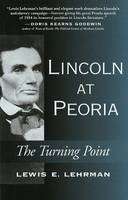Lincoln at Peoria explains how Lincoln's speech at Peoria on October 16, 1854, was the turning point in the development of his antislavery campaign and his political career and thought. Here, Lincoln detailed his opposition to slavery's extension and his determination to defend America's Founding document from those who denied that the Declaration of Independence applied to black Americans. Students of Abraham Lincoln know the canon of his major speeches from his Lyceum Speech of 1838 to his final remarks delivered from a White House window, days before he was murdered in 1865. Less well-known are the two extraordinary speeches given at Springfield and Peoria two weeks apart in 1854. They marked Mr. Lincoln's reentry into the politics of Illinois and, as he could not know, his preparation for the presidency in 1861. These Lincoln addresses catapulted him into the debates over slavery which dominated Illinois and national politics for the rest of the decade. Lincoln delivered the substance of these arguments several times certainly in Springfield on October 4, 1854, for which there are only press reports. A longer version came twelve days later in Peoria. To understand President Abraham Lincoln, one must understand the Peoria speech of October 16, 1854. It forms the foundation of his politics and principles in the 1850s and in his presidency. The Kansas-Nebraska Act, one of the most explosive congressional statutes of American history, repealed the prohibition on slavery in that section of the Louisiana Territory, 36 degree and 30 minute parallel, a restriction on the spread of slavery agreed upon by North and South in the Missouri Compromise of 1820. The Kansas-Nebraska Act, sponsored by the famous Illinois Senator Stephen A. Douglas, inaugurated an incendiary chapter in the slavery debates of the early American Republic. In response to the Kansas-Nebraska Act, Lincoln launched his antislavery campaign. All of his moral and historical arguments opposed any further extension of slavery in the American republic, founded, as he argued, upon the Declaration of Independence. That all men are created equal, with the inalienable right to liberty, was, for Lincoln, a universal principle that Americans must not ignore.
Lewis Lehrman is dedicated to reviving the teaching of American history in its schools and colleges. Mr. Lehrman has written and lectured widely on American history and economics and has written for publications such as the Washington Post, the New York Times, the Wall Street Journal, National Review, the New York Sun, and Policy Review. He also writes for the Lincoln Institute which has created award-winning websites on the 16th president. With Richard Gilder, Mr. Lehrman built the Gilder Lehrman Collection of original historical manuscripts and documents to teach American history from primary sources, now on deposit for public access at the New-York Historical Society. He was presented the National Humanities Medal at the White House in 2005 for his work in American history and is a member of the Advisory Committee of the Abraham Lincoln Bicentennial Commission and the Lincoln Forum.



